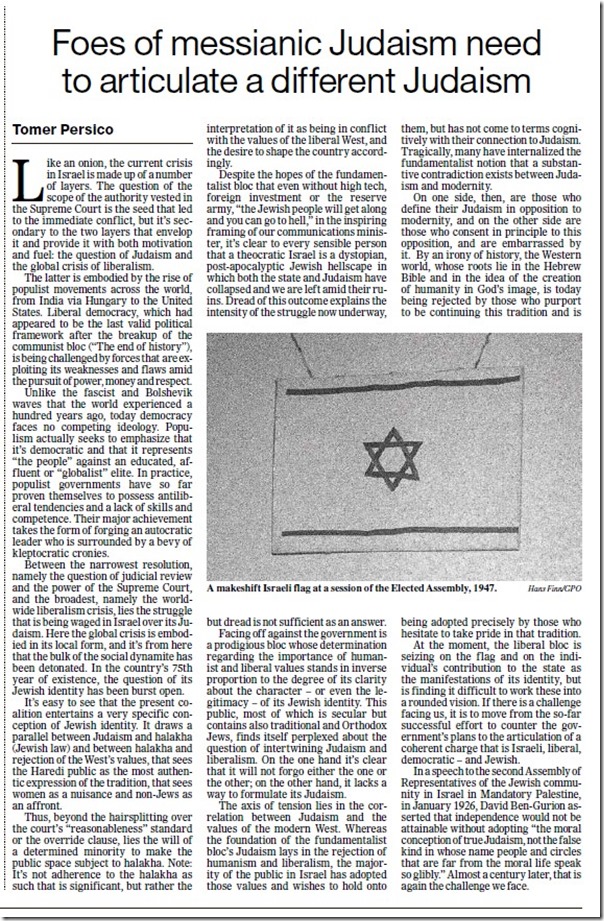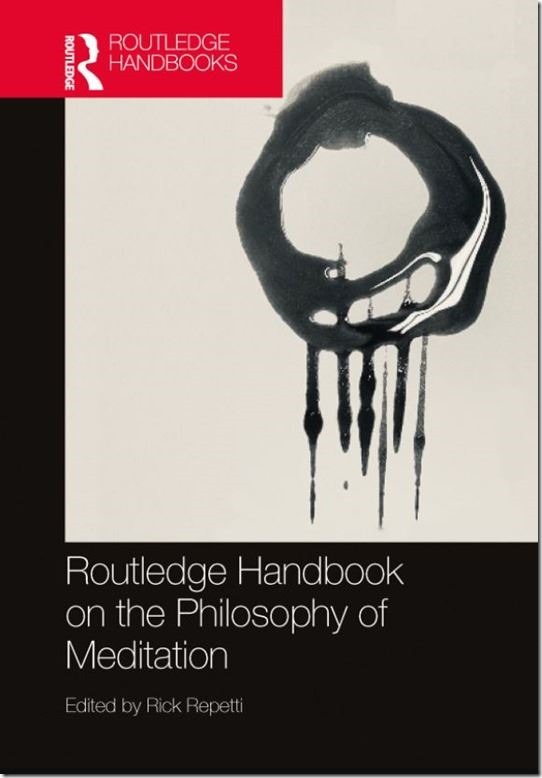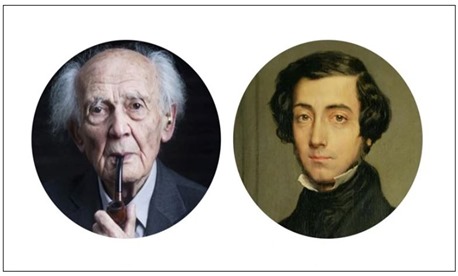In his 1829 essay Reflections on Tragedy, Benjamin Constant insists that there is no more sense in writing plays about the inevitability of destiny or the adversities of fate. What worked for the Greeks would not work anymore. He suggests that playwrights should pit the protagonist against “the state and the action of society.” Constant (d. 1830), a Swiss-French political thinker who was one of the first to adopt the title “Liberal,” suggested that “the social order, the action of society on the individual […] these are the tragic motivations which one needs to know how to manipulate. They are entirely equal to the fatality of the ancients.”
Constant understood that far beyond the lack of belief in the divine Moirai, something fundamental had changed. Entering Modernity, people had become individuals. They would no longer see themselves as part of a wholistic order, a Great Chain of Being stretching from the heavens to the underworld, subjecting them to a preordained purpose into which it was rightful and necessary to fit in. The center of our life is our autonomy, and the threat to that autonomy comes not from the gods but from rulers and courts. The state now holds the power that was once under Zeus or Jehovah.
Modern drama is thus manifested through the slings and arrows of outrageous government. From Shakespeare’s Measure for Measure to Kafka’s The Trial, we witness the unavoidable friction between the individual and the socio-political complex. And as the heart of art pulsates politics and not theology, so does the heart of religion.
—
Where’s the heart of Christianity? Massive White Evangelical support for Donald Trump has long raised doubts about their dedication to the principles they had not too long ago outwardly professed. The insurrectionists at the Capitol on January 6th, 2021, sported quite a few crosses and posters of MAGA hatted Jesus. Once inside the Capitol, Jacob Anthony Chansley, a.k.a. “Q Shaman”, led a prayer from the Senate podium, thanking God for allowing him and his co-hooligans to “send a message to all the tyrants, the communists, and the globalists that this is our nation, not theirs.” Others were Chanting, “Trump is President, Christ is King,” an amalgam of the religious and the political in which the regal title of the Son of God uncomfortably tilts more to the monarchical than the heavenly. A campaign banner read “Jesus 2020”.
To say that this is Christian Nationalism would be a truism. Religion and chauvinistic politics are wedded here, of course, but it’s worth noting that in the process, the place of the religious tradition is minimized. In fact, traditional Christianity, its dogma, ethics, ritual, and customs take a back seat, if at all, in this campaign bus. There is a fundamental unwillingness to get bogged down by traditional beliefs and taboos, and the whole endeavor is not about worship at all. The name of God is vocalized, no doubt, but it emotes less an omniscient transcendental father figure and more a partisan political leader.
This is tribalism, but it comes not from lack of knowledge or dedication to the faith. Church going does not temper tribalism, it stimulates it. According to Pew Forum data in the months before the election, 77% of white evangelicals who attended church at least once a month said they would vote for Trump. Of those attending church weekly, that answer was given 78% of the time. And only 67% of those who attended church less than once a month said they would vote Trump.
In their Taking America Back for God (Oxford, 2020) Andrew Whitehead and Samuel Perry bring further data showing that “those Americans who most strongly espouse Christian nationalist beliefs also tend to be the most religious as measured by activities like church attendance, prayer, and Scripture reading.” They also conclude that “the “Christianity” of Christian nationalism represents something more than religion… It is as ethnic and political as it is religious.”
If the Christianity of the gospels is a universal religion, quite removed from tribalism, the religion spreading today prefers politics over the Gospel. Referring to Trumpism as a major manifestation of Christian Nationalism, Philip Gorski comes to a similar conclusion and states that “Trumpism is, amongst other things, a secularized version of white Christian nationalism, and that Trump’s most ardent evangelical supporters are actually more nationalist than Christian” (American Babylon: Christianity and Democracy Before and After Trump, Routledge, 2020).
What does it take to make a churchgoing Christian more nationalist than Christian? The fact that participation in communal worship is married to political tribalism rather than separated from it means there is something in the way religion functions today that connects it to political passions. Ironically, it is through the church that religion is nationalized.
This phenomenon is not limited to the United States. A 2017 Pew Forum survey found that in Western Europe, “non-practicing Christians are less likely than church-attending Christians to express nationalist views” and “non-practicing Christians are less likely than churchgoing Christians to say that ancestry is key to national identity.” Western European churchgoers also express more anti-immigrant and anti-minority sentiments.
Nor is this only a Western or Christian phenomenon. In India, the BJP party, under Prime Minister Narendra Modi, is reshaping Hinduism. A veritable smorgasbord of traditions, some more internally divergent than Christianity is from Islam, Hinduism is pushed into a monolithic mold and given the essence and edges of a nationalistic ethos. The Rashtriya Swayamsevak Sangh (RSS), a Hindu nationalist movement that forms the source and base of the BJP, views India as a Hindu Rashtra (nation), challenging the secular character of the state formed by its first Prime Minister, Jawaharlal Nehru, and enshrined in the Indian constitution. Contemporary Hindu nationalism today displays all you would expect from your run-of-the-mill, right-wing nationalist movement, from insistence on “secure borders” and fear of illegal infiltration, through initiating vigilante activity and violently fighting ethnic “defilement” and up to silencing dissent. And it does all this using religious symbolism and justification. There’s a coherent theology here, a tribal, nationalistic Theology of the Nation, meaning a religious framework that takes the nation (and not the divine) as its main theological concern and is flexible enough to modify traditional principles of faith to serve it.
Nothing exemplifies this more than the consecration of the Ram Mandir in Ayodhya this January. Built on the ruins of a 16th century mosque, the lavish temple was built after a long and arduous civic and legal battle, which at times devolved into riots in which thousands lost their lives. In what seemed like a national (though solely Hindu) festival in India, the temple was consecrated, with Prime Minister Modi serving as the chief patron of rituals for the event and performing (vegetarian) sacrifices to the main Idol, that of the God Ram. Army Helicopters showered the cheering crowds with colorful flower petals while Modi’s main message in a speech he gave at the event was “Dev to Desh, Ram to Rashtra” – from deity to country, from Ram to nation.
—
The theology of the Nation is not to be confused with civil religion. We are witnessing no overarching civic ethos that uses generic religious frames of reference to express the nation-state’s implicit communal values. Civil religion, as in Robert Bellah’s seminal 1967 article, is a state-formed social institution, an ethos shared by citizens working together for their republic, while the Theology of the Nation is a religious need, using explicit religious symbols and holding religious hopes, fostering nationalism and energizing congregations.
Nor is this a case of a state-sponsored and controlled church, in which the state employs a religious system to empower the national movement (such as in Franco’s Spain and Putin’s Russia). On the contrary, here, nationalism is used by religion. As with the American evangelicals, the religious tradition adopts the state as its central point of reference and uses nationalism as a dominant theological context.
Of course, the political powers are more than willing to manipulate faith to their advantage, and of course they do. But in this case, religion needs politics more than vice versa. The tradition finds substantial sustenance in the political sphere and is galvanized by the struggles of the state and the nation. The Theology of the Nation is borne out of the modern crises of tradition.
…
For the rest of the article please go to its location at the Nexus site.
















